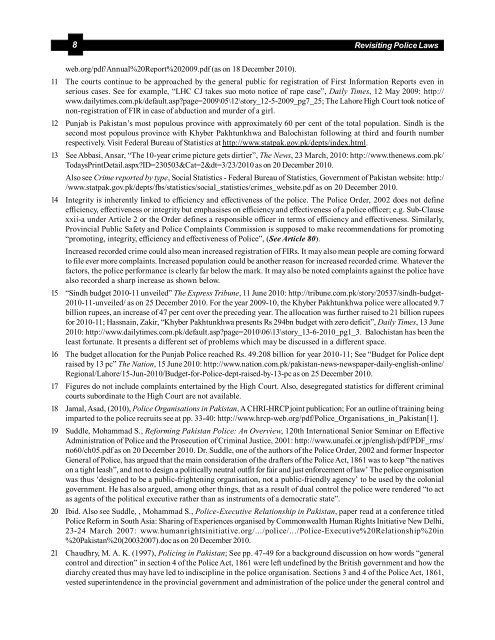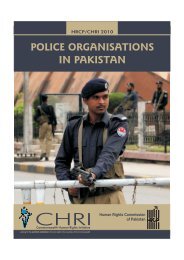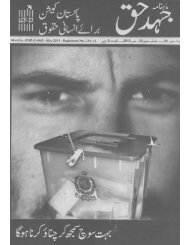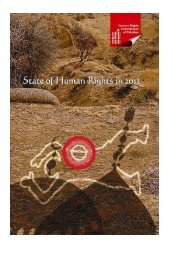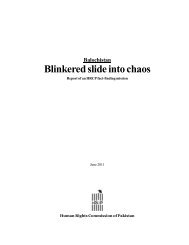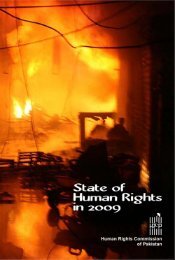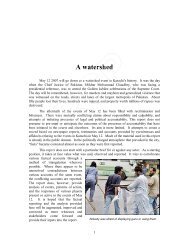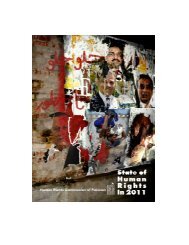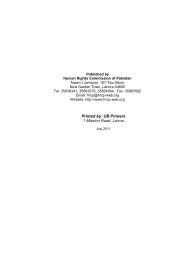Download PDF file - Human Rights Commission of Pakistan
Download PDF file - Human Rights Commission of Pakistan
Download PDF file - Human Rights Commission of Pakistan
- No tags were found...
Create successful ePaper yourself
Turn your PDF publications into a flip-book with our unique Google optimized e-Paper software.
8Revisiting Police Lawsweb.org/pdf/Annual%20Report%202009.pdf (as on 18 December 2010).11 The courts continue to be approached by the general public for registration <strong>of</strong> First Information Reports even inserious cases. See for example, “LHC CJ takes suo moto notice <strong>of</strong> rape case”, Daily Times, 12 May 2009: http://www.dailytimes.com.pk/default.asp?page=2009\05\12\story_12-5-2009_pg7_25; The Lahore High Court took notice <strong>of</strong>non-registration <strong>of</strong> FIR in case <strong>of</strong> abduction and murder <strong>of</strong> a girl.12 Punjab is <strong>Pakistan</strong>’s most populous province with approximately 60 per cent <strong>of</strong> the total population. Sindh is thesecond most populous province with Khyber Pakhtunkhwa and Balochistan following at third and fourth numberrespectively. Visit Federal Bureau <strong>of</strong> Statistics at http://www.statpak.gov.pk/depts/index.html.13 See Abbasi, Ansar, “The 10-year crime picture gets dirtier”, The News, 23 March, 2010: http://www.thenews.com.pk/TodaysPrintDetail.aspx?ID=230503&Cat=2&dt=3/23/2010 as on 20 December 2010.Also see Crime reported by type, Social Statistics - Federal Bureau <strong>of</strong> Statistics, Government <strong>of</strong> <strong>Pakistan</strong> website: http://www.statpak.gov.pk/depts/fbs/statistics/social_statistics/crimes_website.pdf as on 20 December 2010.14 Integrity is inherently linked to efficiency and effectiveness <strong>of</strong> the police. The Police Order, 2002 does not defineefficiency, effectiveness or integrity but emphasises on efficiency and effectiveness <strong>of</strong> a police <strong>of</strong>ficer; e.g. Sub-Clausexxii-a under Article 2 or the Order defines a responsible <strong>of</strong>ficer in terms <strong>of</strong> efficiency and effectiveness. Similarly,Provincial Public Safety and Police Complaints <strong>Commission</strong> is supposed to make recommendations for promoting“promoting, integrity, efficiency and effectiveness <strong>of</strong> Police”, (See Article 80).Increased recorded crime could also mean increased registration <strong>of</strong> FIRs. It may also mean people are coming forwardto <strong>file</strong> ever more complaints. Increased population could be another reason for increased recorded crime. Whatever thefactors, the police performance is clearly far below the mark. It may also be noted complaints against the police havealso recorded a sharp increase as shown below.15 “Sindh budget 2010-11 unveiled” The Express Tribune, 11 June 2010: http://tribune.com.pk/story/20537/sindh-budget-2010-11-unveiled/ as on 25 December 2010. For the year 2009-10, the Khyber Pakhtunkhwa police were allocated 9.7billion rupees, an increase <strong>of</strong> 47 per cent over the preceding year. The allocation was further raised to 21 billion rupeesfor 2010-11; Hassnain, Zakir, “Khyber Pakhtunkhwa presents Rs 294bn budget with zero deficit”, Daily Times, 13 June2010: http://www.dailytimes.com.pk/default.asp?page=2010\06\13\story_13-6-2010_pg1_3. Balochistan has been theleast fortunate. It presents a different set <strong>of</strong> problems which may be discussed in a different space.16 The budget allocation for the Punjab Police reached Rs. 49.208 billion for year 2010-11; See “Budget for Police deptraised by 13 pc” The Nation, 15 June 2010: http://www.nation.com.pk/pakistan-news-newspaper-daily-english-online/Regional/Lahore/15-Jun-2010/Budget-for-Police-dept-raised-by-13-pc as on 25 December 2010.17 Figures do not include complaints entertained by the High Court. Also, desegregated statistics for different criminalcourts subordinate to the High Court are not available.18 Jamal, Asad, (2010), Police Organisations in <strong>Pakistan</strong>, A CHRI-HRCP joint publication; For an outline <strong>of</strong> training beingimparted to the police recruits see at pp. 33-40: http://www.hrcp-web.org/pdf/Police_Organisations_in_<strong>Pakistan</strong>[1].19 Suddle, Mohammad S., Reforming <strong>Pakistan</strong> Police: An Overview, 120th International Senior Seminar on EffectiveAdministration <strong>of</strong> Police and the Prosecution <strong>of</strong> Criminal Justice, 2001: http://www.unafei.or.jp/english/pdf/<strong>PDF</strong>_rms/no60/ch05.pdf as on 20 December 2010. Dr. Suddle, one <strong>of</strong> the authors <strong>of</strong> the Police Order, 2002 and former InspectorGeneral <strong>of</strong> Police, has argued that the main consideration <strong>of</strong> the drafters <strong>of</strong> the Police Act, 1861 was to keep “the nativeson a tight leash”, and not to design a politically neutral outfit for fair and just enforcement <strong>of</strong> law’ The police organisationwas thus ‘designed to be a public-frightening organisation, not a public-friendly agency’ to be used by the colonialgovernment. He has also argued, among other things, that as a result <strong>of</strong> dual control the police were rendered “to actas agents <strong>of</strong> the political executive rather than as instruments <strong>of</strong> a democratic state”.20 Ibid. Also see Suddle, , Mohammad S., Police-Executive Relationship in <strong>Pakistan</strong>, paper read at a conference titledPolice Reform in South Asia: Sharing <strong>of</strong> Experiences organised by Commonwealth <strong>Human</strong> <strong>Rights</strong> Initiative New Delhi,23-24 March 2007: www.humanrightsinitiative.org/.../police/.../Police-Executive%20Relationship%20in%20<strong>Pakistan</strong>%20(20032007).doc as on 20 December 2010.21 Chaudhry, M. A. K. (1997), Policing in <strong>Pakistan</strong>; See pp. 47-49 for a background discussion on how words “generalcontrol and direction” in section 4 <strong>of</strong> the Police Act, 1861 were left undefined by the British government and how thediarchy created thus may have led to indiscipline in the police organisation. Sections 3 and 4 <strong>of</strong> the Police Act, 1861,vested superintendence in the provincial government and administration <strong>of</strong> the police under the general control and


